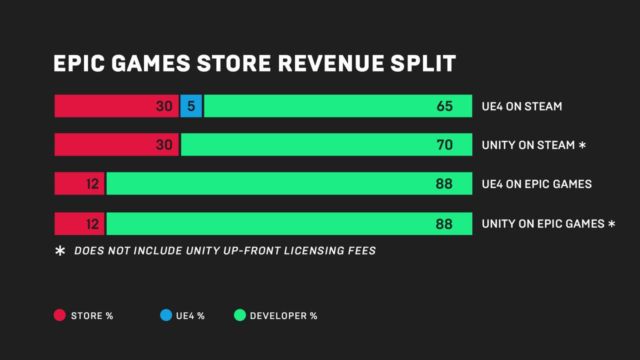
Over the years, we’ve seen a lot of new PC game platforms try to make a dent in Steam’s market-dominating position. Epic Games announced it’s having a go at the leader this morning with an upcoming platform, the Epic Games Store, that promises more developer-friendly publishing terms.
Unlike Valve, which takes a baseline 30 percent of revenues from most games and content sold on Steam, Epic is promising to take only 12 percent of developer revenues on its new store. That matches the revenue cut Epic already takes on development assets sold through the existing Unreal Marketplace, a cut the company recently lowered from 30 percent.
“As a developer ourselves, we’ve always wanted access to a store with fair revenue-sharing that gives us direct access to our customers,” Epic Founder and CEO Tim Sweeney told Ars in an email interview. “Now that we’ve built such a store, and Fortnite has brought in a huge audience of PC gamers, we’re working to open it up to all developers.”
Keep it small
Epic is keeping mum for now on specific launch date and game line-up details for its new store, but said in a release that “the store will launch soon with a hand-curated set of games on PC and Mac and will open up more broadly to additional games and other open platforms throughout 2019.” Sweeney told Ars that the company plans to “start small” and will “sometimes fund developers to release games exclusively through the store,” Sweeney told Ars.
The approval process for new games will “mostly focus on the technical side of things and general quality,” Sweeney said. “Except for adult-only content, we don’t plan to curate based on developers’ creative or artistic expression.” That differs somewhat from Steam, which now allows adult-oriented content as part of a largely lasseiz-faire curation policy.

Sweeney also told Ars Epic will “manually curate the Epic Games storefront rather than relying on algorithms or paid ads.” That’s a not-too-subtle dig at Steam’s more programmatic methods for guiding users through an increasingly bloated list of games.
“We believe the ultimate vector for players to discover new games will not be our storefront but creators,” Sweeney said. To that end, Epic said the Store’s “Support-a-Creator” program will “connect developers with over 10,000 creators, such as YouTube video makers and Twitch streamers,” to bring more exposure to listed titles.
Rising above the competition
Epic isn’t the only company that has tried to take on Steam in recent months. Popular gaming-focused social network Discord launched its own curated game store earlier this year, including a number of timed exclusive “first on Discord” indie games. And browser-focused gaming network Kongregate recently launched its own PC gaming store where players can receive discounts on games and other real-world rewards for earning in-game achievements.

But Epic comes into the crowded PC game platform market with a few advantages. For one, the company has already grown Fortnite into one of the most popular games in the world without the help of third-party platforms like Steam or Google’s Play store on Android. Fortnite will be exclusive to the Epic Games Store on PC and Mac, Sweeney said, alongside other Epic Games titles like the new Unreal Tournament. And while the launch will just include a basic storefront, Sweeney said Epic “plan[s] to take more of the online features we built for our own games, and open them up to other developers.”
Epic also has the advantage of being one of the biggest game engine makers in the world through the Unreal Engine. While Epic said the first games for Epic’s store will span “Unreal, Unity and other engines,” Unreal-powered games will get somewhat preferential treatment through a waiving of Epic’s usual 5 percent engine royalty fees. That means game-makers using Unreal could take home an additional 23 percent of a game’s revenue by selling on the Unreal Games Store rather than Steam.
Valve is already showing some signs that it’s worried about increasing competition for Steam. Last week, the company announced it was changing its own royalty structure for Steam, reducing its cut slightly for games that sell $10 million or more.
Still, Sweeney says he isn’t expecting to take over Valve’s dominant position in the near future. “We’re not looking to crush Steam any time soon,” he said. “We’re just building a store with a fair deal for developers that creates new opportunities for content creators! We’ll be expanding it and investing in it for years to come.”
https://arstechnica.com/?p=1422489

